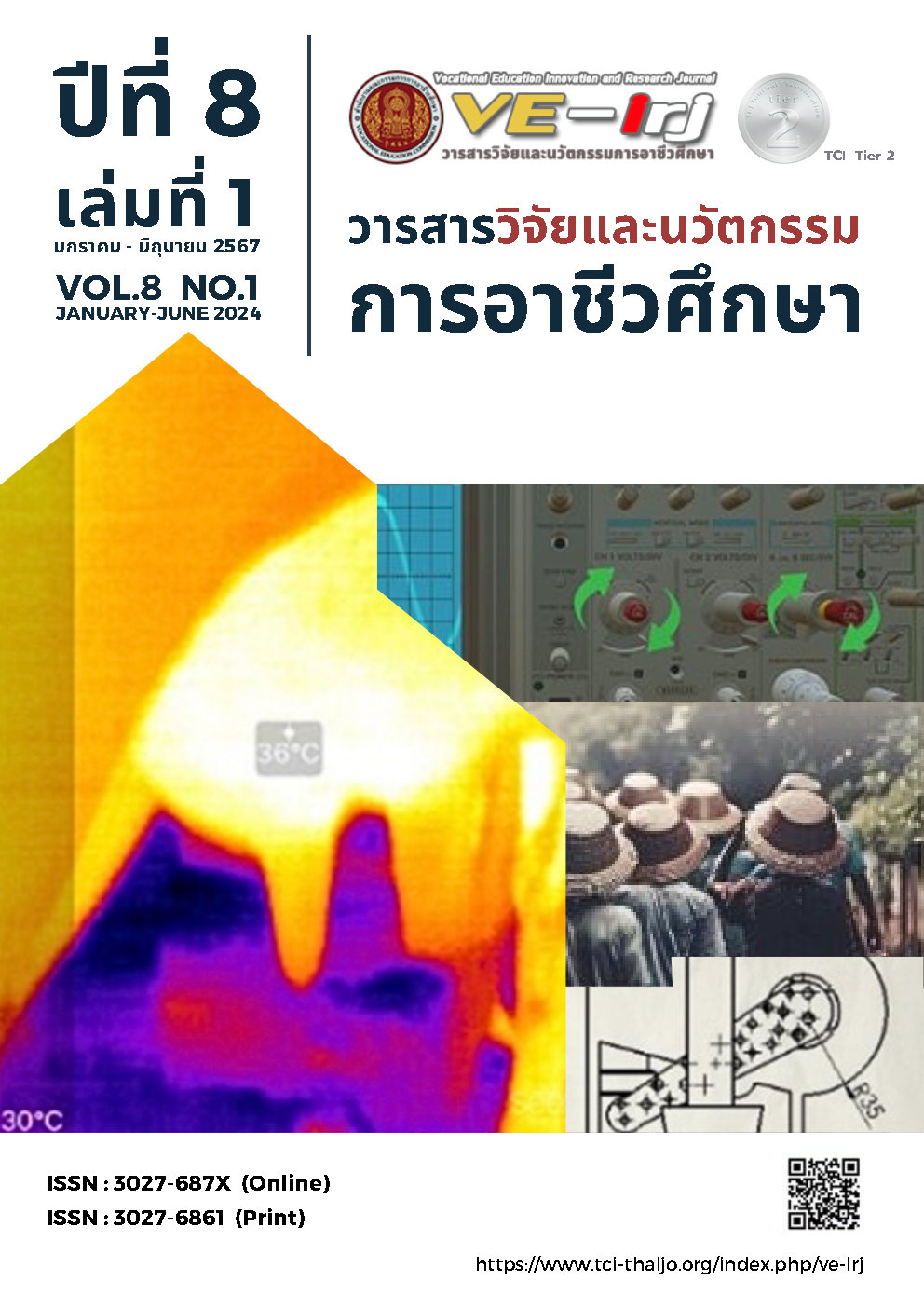Relationship Between Emotional Quotient and Spirituality Quotient Affecting Innovative Behavior of Academic Support Personnel of Rajamangala University of Technology Krungthep
Main Article Content
Abstract
This research aimed to 1) A study the level of emotional quotient, spirituality quotient and innovative behavior of academic support personnel, and 2) A study the relationship between emotional quotient and spirituality quotient affecting innovative behavior of academic support personnel. The sample was 210 academic support personnel of Rajamangala University of Technology Krungthep derived by convenience sampling. Data were collected by an online questionnaire with Google Form and statistically analyzed using descriptive statistics including percentage, mean and standard deviation. The inferential statistics methods used to test hypothesis is multiple regression analysis. The research results were as follows: 1) The innovative behavioral variables, emotional quotient and spirituality quotient were at the high average level and 2) The emotional quotient, in self-awareness, self-regulation and spirituality quotient, in conscious state expansion affecting innovative behaviors of academic support personnel at .01 statistically significant levels and the emotional quotient variable in social skills, spirituality quotient, in critical existential thinking and transcendental awareness affecting innovative behaviors of academic support personnel at .05 statistically significant levels. These factors together predicted the innovative behavior of academic support personnel for 61.1 percent.
Article Details

This work is licensed under a Creative Commons Attribution-NonCommercial-NoDerivatives 4.0 International License.
สงวนสิทธิ์ โดย สถาบันการอาชีวศึกษาภาคตะวันออกเฉียงเหนือ 1
306 หมู่ 5 ถนนมิตรภาพ หนองคาย-อุดรธานี ตำบลโพธิ์ชัย อำเภอเมืองหนองคาย จังหวัดหนองคาย 43000
โทร 0-4241-1445,0-4241-1447
ISSN : 3027-6861 (print) ISSN : 3027-687X (online)
References
ศุภชัย หล่อโลหการ ภคพงศ์ พรมนุชาธิป และ ปัทมาวดี พัวพรหมยอด. (2553). การจัดการนวัตกรรมสำหรับผู้บริหาร. พิมพ์ครั้งที่ 3 . สำนักงานนวัตกรรมแห่งชาติกระทรวงวิทยาศาสตร์และเทคโนโลยี. กรุงเทพมหานคร.
สุธาสินี โพธิจันทร์. (2559). ทักษะการทำงานที่จำเป็นในยุค Industry 4.0: สถาบัน เพิ่มผลผลิตแห่งชาติ. ค้นเมื่อ 1 มีนาคม 2565, จาก www.ftpi.or.th.
Paul, V. M. T., & Devi, N. U. (2018). Psychological capital, outcome expectation and job performance: A Mediated model of innovative work behavior. International Journal for Research in Engineering Application & Management, 1(1), 52-60.
กรมสุขภาพจิต กระทรวงสาธารณสุข. (2543). การพัฒนาแบบประเมินความฉลาดทางอารมณ์สําาหรับประชาชนไทย อายุ 12-60 ปี. กรุงเทพฯ : กรมสุขภาพจิต.
Mayer, J. D., Salovey, P., Caruso, D. R., & Sternberg, R. J. (2000). Models of emotional intelligence. JD Mayer.
Hou, X., Yuan, Q., Hu, K., Huang, R., & Liu, Y. (2020). Employees' emotional intelligence and innovative behavior in China: Organizational political climate as a moderator. Social Behavior and Personality: an international journal, 48(11), 1-11.
Choi, M. H., & Min, H. H. (2020). Emotional intelligence and self-efficacy on innovative behavior of clinical dental hygienists. Journal of Korean society of Dental Hygiene, 20(2), 167-174.
Malik, S. (2021). Emotional intelligence and innovative work behaviour in knowledge-intensive organizations: how tacit knowledge sharing acts as a mediator?. VINE Journal of Information and Knowledge Management Systems.
Bavandi Sani, S. M., Malekzadeh, G., & Pooya, A. (2019). Investigating the Effect of Spiritual Intelligence on the Job Performance of the Employees by the Mediating Role of Individual Innovations (Case of Mehre Eghtesad Bank in Khorasan Razavi). Journal Of Social Sciences, 15(2), 173-212.
Masyhuri, M., Pardiman, P., & Siswanto, S. (2021). The effect of workplace spirituality, perceived organizational support, and innovative work behavior: The mediating role of psychological well-being. Journal of Economics, Business, & Accountancy Ventura, 24(1), 63-77.
Themistocleous, M., Irani, Z., & Love, P. E. the 38th Annual Hawaii International Conference on System Sciences (pp. 228-228). IEEE.
Paul, V. M. T., & Devi, N. U. (2018). Psychological capital, outcome expectation and job performance: A Mediated model of innovative work behavior. International Journal for Research in Engineering Application & Management, 1(1), 52-60.
Kleysen, R. F. and Street, C. T. (2001). Toward a multi‐dimensional measure of individual innovative behavior. Journal of Intellectual Capital, 2 (3), 284-296.
Golemen, D. (1998). Working with Emotional Inelligence. New York : Bantam Book.
King, D. B and DeCicco, T. L. (2009). A viable model and self-report measure of spiritual intelligence.International Journal of Transpersonal Studies.,28, 68-85.
Rovinelli, R., & Hambleton, R. K. (1976). On the use of content specialists in the assessment of criterion- referenced test item validity. Washington, D.C. : ERIC.
บุญชม ศรีสะอาด. (2556). วิธีการทางสถิติสำหรับการวิจัย เล่ม 1.พิมพ์ครั้งที่ 5. กรุงเทพฯ: สุวีริยาสาส์น.
Nunnally, J. C. (1978) Psychometric theory (2nd Ed.). New York : McGraw-Hill.
ธานินทร์ ศิลป์ จารุ. (2552). การวิจัยและวิเคราะห์ข้อมูลทางสถิติด้วย SPSS. พิมพ์ครั้งที่ 10. กรุงเทพมหานคร: บิสซิเนสอาร์แอนด์ดี.
ศิริชัย พงษ์วิชัย. (2550). การวิเคราะห์ข้อมูลทางสถิติด้วยคอมพิวเตอร์(พิมพ์ครั้งที่18). กรุงเทพมหานคร: สุพีเรีย พริ้นติ้งเฮาส์.
ประสิทธิ์ สันติกาญจน์. (2551). การทดสอบข้อกำหนดเบื้องต้นของการวิเคราะห์เส้นโยง. BU Academic Review, 7(1), 27-45.
Zikmund, W. G., Babin, B. J., Carr, J. C., & Griffin, M. (2013). Business research methods (9th ed.). Singapore: Cengage Learning.
Martins, E. C., & Terblanche, F. (2003). Building organisational culture that stimulates creativity and innovation. European journal of innovation management.
Modassir, A., & Singh, T. (2008). Relationship of emotional intelligence with transformational leadership and organizational citizenship behavior. International Journal of Leadership Studies, 4(1), 3-21.
วีระวัฒน์ ปันนิตามัย. (2551).เชาวน์อารมณ์ (EQ) ดัชนีเพื่อความสุขและความสําเร็จของชีวิต. พิมพ์ครั้งที่ 7. กรุงเทพมหานคร: สํานักพิมพ์แห่งจุฬาลงกรณ์มหาวิทยาลัย.
ศักดิ์ชัย จันทะแสง และ กันตภณ ธรรมวัฒนา. (2559). โมเดลความสัมพันธ์เชิงสาเหตุระหว่างความฉลาด ทางอารมณ์และการรับรู้ความยุติธรรมในองค์การที่ส่งผลต่อพฤติกรรมการเป็นสมาชิกที่ดีต่อองค์การของบุคลากร สายสนับสนุนมหาวิทยาลัยเทคโนโลยีราชมงคลกรุงเทพ. วารสารปัญญาภิวัฒน์, 8(3), 130-144.
Green, W.N., and Noble, K. D. (2010). Fostering spiritual intelligence: Undergraduates’ growth in a course about consciousness.Advanced Development Journal,12(1), 26-49.
Lianying, Z. and Weijie, F. (2013). Improving performance of construction projects: a project manager’s emotional intelligence approach. Engineering, Construction and Architectural Management, 20 (2), 195-207.
Ebrahimpour, H., Hoseynnajad, N., Nemati, V., & Tagipour, F. (2015). A survey of the relationship between spiritual intelligence on teacher’s innovative behavior. Journal of School Psychology, 4(1), 7-21.


